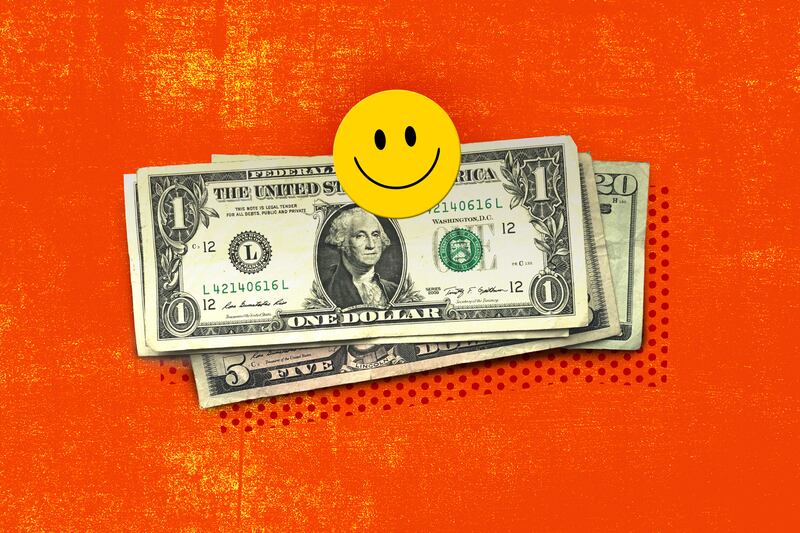In the search for happiness — and who doesn’t want that? — 6 in 10 Americans think a key ingredient is money. Lots of money.
A survey just released by Empower found that adults in the U.S. would be a lot happier if they got a large pay raise. Among those polled, the median salary was $65,000 a year and they estimated a pay bump to about $95,000 a year would make them happier and less stressed. Among those high earners whose median salary is about $250,000 a year, they estimated about $350,000 a year would make them happy.
The Wall Street Journal reported, “Employers are planning on an average pay increase of 3.9% in 2024 for nonunion employees, according to a survey from the consulting firm Mercer. In the Empower survey, Americans said that to be happy, they would need almost a 50% raise.”
The Empower report said that “for centuries, Americans have been rewarded for their relentless pursuit of happiness — in life, work, play — and of course, money. If financial happiness has a price tag, the average person believes it amounts to $1.2 million. But that’s not the full story. It turns out that a little goes a long way, as our research finds that incremental financial wins make a massive impact on Americans’ well-being.”
About a third of the 2,034 adults surveyed said that as little as $15,000 would boost their financial happiness for six months. The share who believe that and the length it would last goes up with increased amounts.
The issue is a sense of security, with most saying they will be financially happy if they don’t have to rely on others financially, can cope with unexpected financial needs and can take care of their loved ones. Two-thirds said being able to pay bills on time would boost their happiness.
“Americans agree that financial happiness can have a transformative effect across many measures of the good life: a sense of accomplishment and productivity at work (77%) generational wealth (84%), inspiring greater innovation (71%), and boosting their overall health (79%),” Empower’s report said.
It noted that “Americans are optimistic, though economic factors are dampening feelings of prosperity.” The report also said Americans see a link between financial happiness and health and that having a financial plan is vital to happiness.
CBS News reports that “the findings come at a time when Americans are feeling more stressed by money, partly due to the impact of inflation, which has been elevated for more than a year.” And it notes that workers “aren’t likely to receive the type of raises next year that could put them anywhere near” the dream salary they list of about $284,000 a year for real salary happiness.
Money helps, but how much?
The article said there’s a fair amount of truth to money helping one’s happiness quotient.
“Earlier this year, Nobel Prize-winning economist Daniel Kahneman and fellow researchers dug into the question after earlier academic research had concluded that money could only boost happiness up to a certain point, at about $75,000 in annual income,” CBS reported.
The article said, “The new study from Princeton University’s Kahneman found that money actually delivers a continual return on investment — up to earnings of $500,000 per year. Beyond that figure, he and his other researchers concluded, money had little impact.”
Other studies have suggested money can bring some happiness. In 2022, PNAS published an international study in which anonymous donors gave $10,000 to each of 200 recipients in seven countries. They compared those who got the largesse with a control group that didn’t.
The authors, from the University of British Columbia, said the experiment “provides causal evidence that cash transfers substantially increase happiness across a diverse global sample. These gains were greatest for recipients who had the least: Those in lower-income countries gained three times more happiness than those in higher-income countries.”
They suggested that “private citizens” with a lot of resources could give some of it to those who had less and boost global happiness.
More than money
Happiness is not just about feeling good. It has implications for health, too. Research in the Annual Review of Public Health from 2019 said that “happiness is generally associated with reduced mortality in prospective observational studies,” although the details sometimes vary. Research, it notes, has previously suggested that “impaired happiness is not only a consequence of ill health but also a potential contributor to disease risk.”
Experts have long said that volunteering boosts the volunteer’s happiness as well as the recipient’s. They say relationships are absolutely vital to being happy and have a huge impact on health. And research also suggests that the best gifts are those where one shares time and an experience, creating memories that boost happiness, as The Telegraph reported.
In February, Deseret News summarized suggestions to boost happiness, looking at a variety of studies. We reported:
- Forgive to find happiness, based on a 2022 study by Turkish researchers in Current Psychology. That helps get rid of negative emotions, including anxiety and depression and was a “positive predictor of individuals’ happiness level.”
- Have a sense of meaning and purpose because subjective well-being offers physical and emotional benefits and helps longevity.
- Support others and be kind, since The World Happiness Report 2022 showed the increased social support and benevolence in the pandemic was helpful along multiple measures. A 2018 study in the Journal of Social Psychology said those who provide emotional support to others are more apt to find happiness themselves.
- Have faith. People who hold religious or spiritual beliefs are happier, said psychologist Catherine Sanderson, a professor at Amherst College who wrote “The Positive Shift: Mastering Mindset to Improve Happiness, Health and Longevity.“
- Grow your own joy. Celebrate little things, but don’t try too hard to be happy, or the pursuit itself can make you unhappy, as an article in Positive Psychology pointed out.


